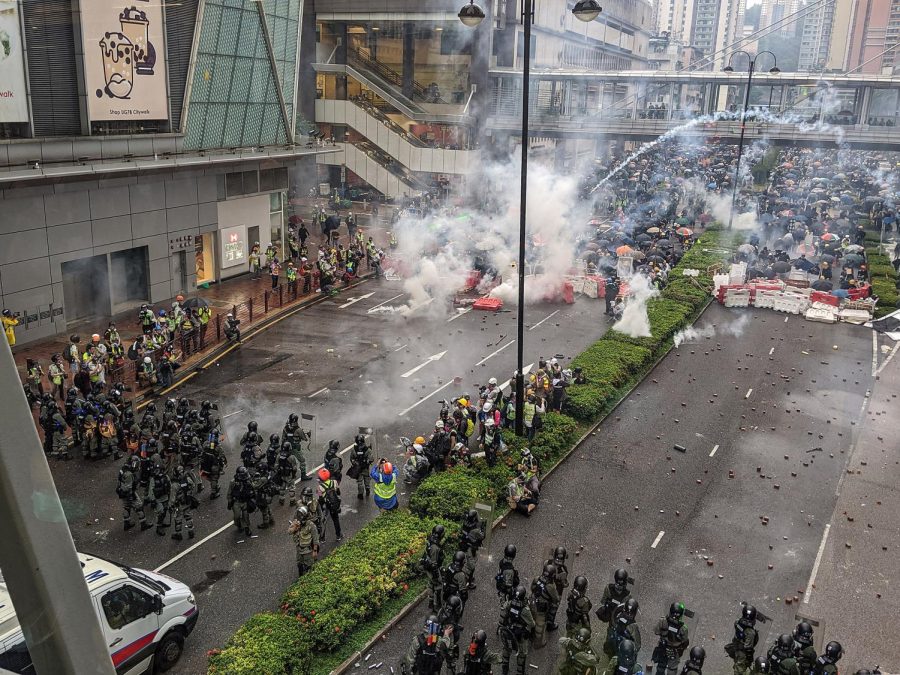The End of an Era
Is Hong Kong’s democracy coming to an end?
A large group of protesters run into a police barricade in the Tsuen Wan neighborhood of Hong Kong. Image from Wikimedia Commons.
May 5, 2022
Life under a democracy is not perfect; bureaucracy can be slow, and representatives often betray their constituents in favor of greater power. However, democracy still affords the right for every person to have a voice. Soon the people of Hong Kong may lose that right.
The city of Hong Kong, a long-time territory of Great Britain, was returned to the Chinese nation in 1997. Great Britain had gained the territory from China in the first in a series of wars between the British and China called the Opium Wars. Under British rule, the small port city on the southern coast of China grew to become a neon-lit hub of culture and commerce. But, in 1984, Britain and China agreed that, in the year 1997, Hong Kong would be returned to China as long as it retained its capitalist economic system and democratic government. This agreement was set to expire in 2047.
China had, for the most part, kept its side of the bargain until 2019 when a bill was introduced in the aftermath of a murder case involving a citizen of Hong Kong killing his wife while on vacation in Taiwan, a nation not recognized by China. The bill, titled The Fugitive Offenders and Mutual Legal Assistance in Criminal Matters Legislation Amendment Bill, allowed Hong Kong to legally transfer people from nations Hong Kong had no previous legal transfer agreements with. This bill, in turn, allowed the government of China to detain any Hong Kong residents in mainland China where the judges must follow orders from the Chinese government. This rule would affect not only criminals but also political activists.
After the bill was passed, protests, to some reports attended by over a million people, erupted across the city. Initially, the protesters’ objective was to have the bill retracted, but as the protests continued, they added five more objectives: the retraction of the riot classification of the protests, the release and exoneration of arrested protesters, the establishment of an independent commission to investigate police misconduct during the protests, the resignation of Hong Kong’s chief executive, Carrie Lam, and the implementation of universal suffrage in the legislative council elections of Hong Kong. None of these objectives have been achieved.
The protesters were making ground, and it looked as if maybe they would accomplish their objectives. But the COVID-19 pandemic caused protester numbers to dwindle, and a law titled the National Security Law changed the basic law of Hong Kong to ban any acts of “secession, foreign interference, terrorism and subversion against the central government” was passed without going through local legislation. Both of those events were deathblows to the movement. The government of Hong Kong then began a mass crackdown on political activists and politicians that supported the movement, and the Chinese mainland continued to tighten its control over Hong Kong.
The legislators behind the National Security Law have stated that the law would allow the time for Hong Kong to retain its democratic liberties to be extended beyond 2047, but opponents of the bill have questioned whether the authoritarian policies imposed in the bill have already stripped citizens of their freedoms.
That brings us to today. The chief executive Carrie Lam resigned and the man who introduced the original bill that started the protests, John Lee, is expected to take her place. Hong Kong has long stood as a bastion of democracy in the largely authoritarian South China Sea, but it looks as if that time may be coming to a close.
Additional Sources:
https://www.nytimes.com/2019/11/13/world/asia/hong-kong-protests.html
https://www.nytimes.com/2020/06/09/world/asia/hong-kong-protests-one-year-later.html
https://www.cnn.com/specials/asia/hong-kong-protests-intl-hnk






